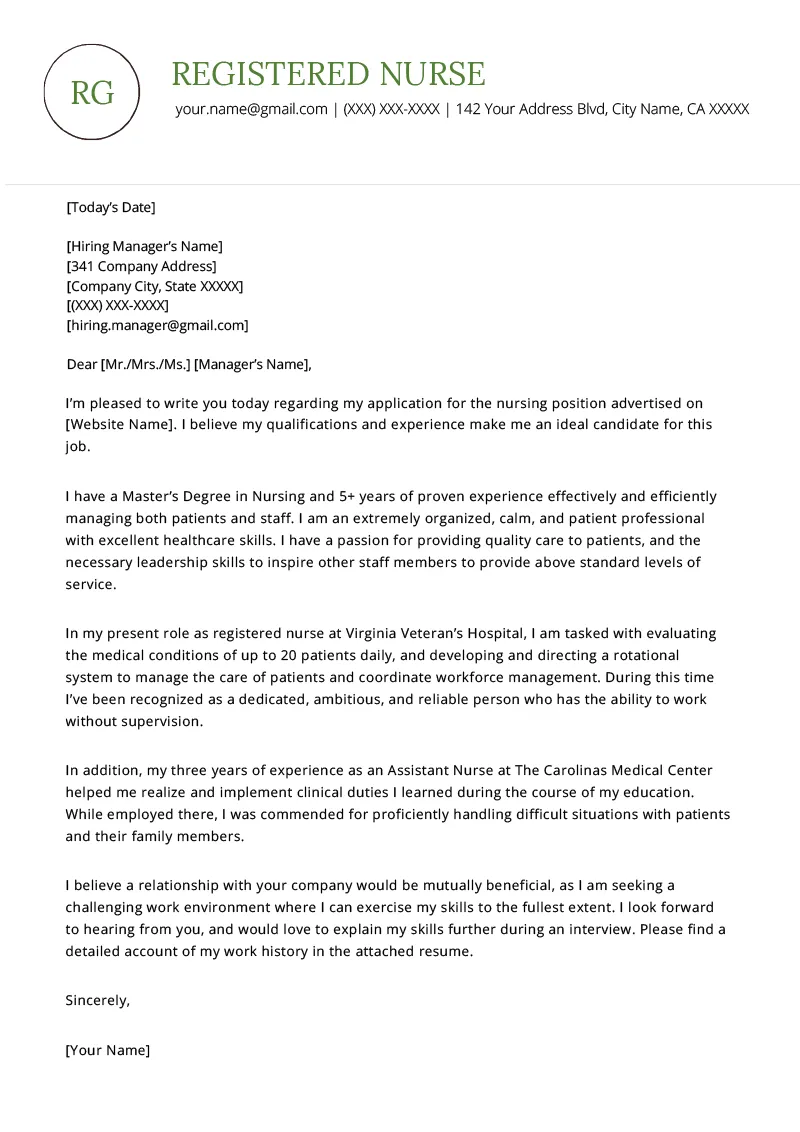Understanding the Importance of an RN Cover Letter
In the competitive field of nursing, securing your dream Registered Nurse (RN) position requires more than just a strong resume. A well-crafted cover letter can be the crucial element that sets you apart from other applicants. It serves as your introduction, allowing you to showcase your personality, passion, and suitability for the role. A compelling cover letter provides an opportunity to explain why you are the perfect fit for the specific RN position, highlighting your relevant experience and skills in a way that a resume alone cannot. It’s your chance to make a lasting first impression and persuade the hiring manager to delve deeper into your qualifications.
Why a Cover Letter Matters
A cover letter is not just a formality; it’s a strategic tool in your job search arsenal. It allows you to personalize your application and directly address the needs of the hiring manager. By demonstrating your understanding of the role and the organization’s values, you show genuine interest and initiative. A well-written cover letter can bridge gaps in your resume, explain career changes, and highlight accomplishments that might not be immediately obvious. It gives you the space to elaborate on your skills, experiences, and career goals, proving to the employer that you are not just qualified, but also an enthusiastic candidate.
Highlighting Your Skills and Experience
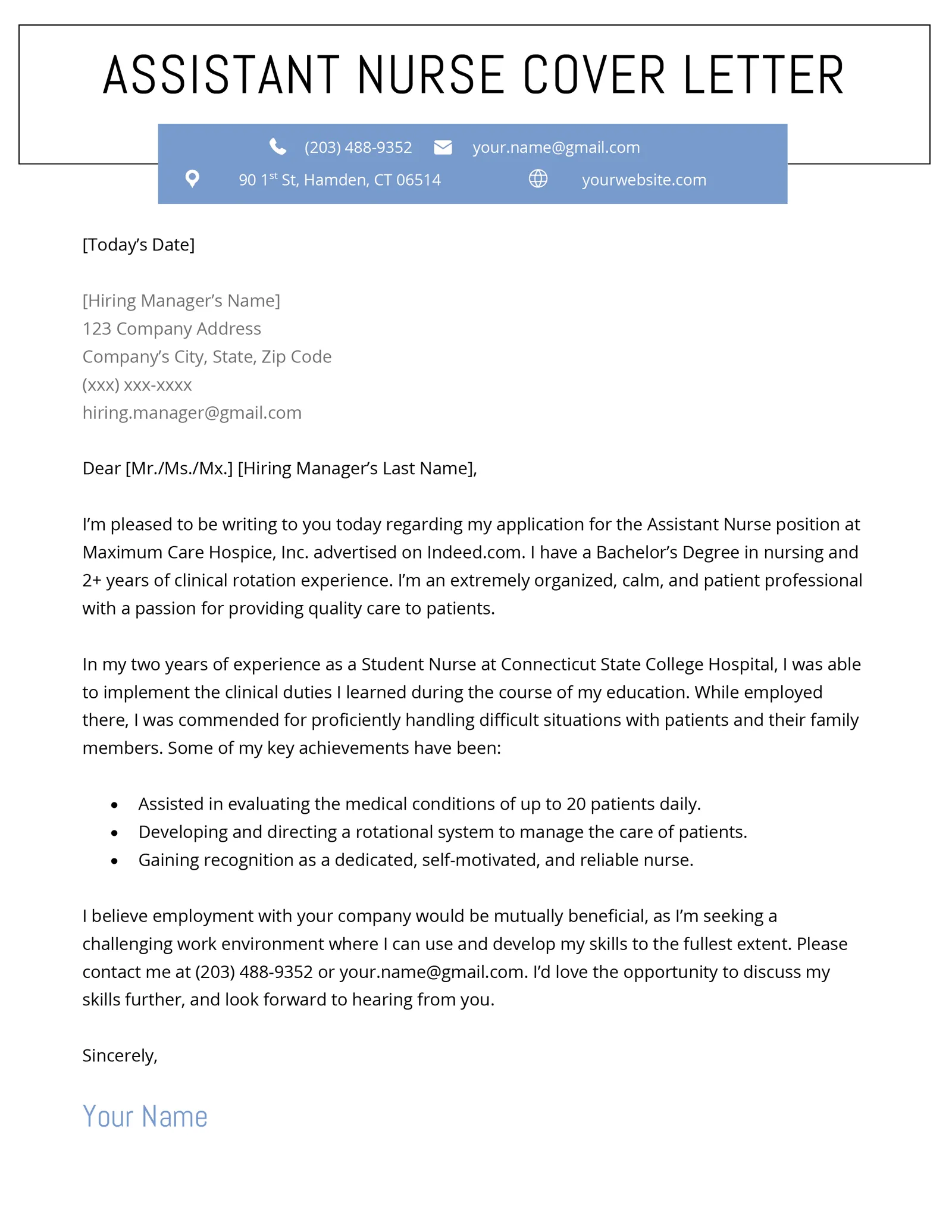
The cover letter offers a platform to highlight your most relevant skills and experience. Think of it as your personal marketing document. Carefully select the skills and experiences that align with the specific job description. Use this opportunity to showcase your accomplishments in a way that resonates with the employer. Quantify your achievements whenever possible. For example, instead of stating, ‘Managed patient care,’ you might say, ‘Managed care for a ward of 30 patients, resulting in a 15% reduction in patient readmission rates.’ This approach offers concrete proof of your capabilities and makes a more significant impact.
Key Components of an Effective RN Cover Letter
Header and Contact Information
Begin with a professional header that includes your name, address, phone number, and email address. This ensures the hiring manager knows how to contact you. Below your contact information, include the date and the hiring manager’s name (if known), title, and the organization’s address. Properly formatting this section is essential for demonstrating professionalism and attention to detail.
Opening Paragraph: Grab Attention
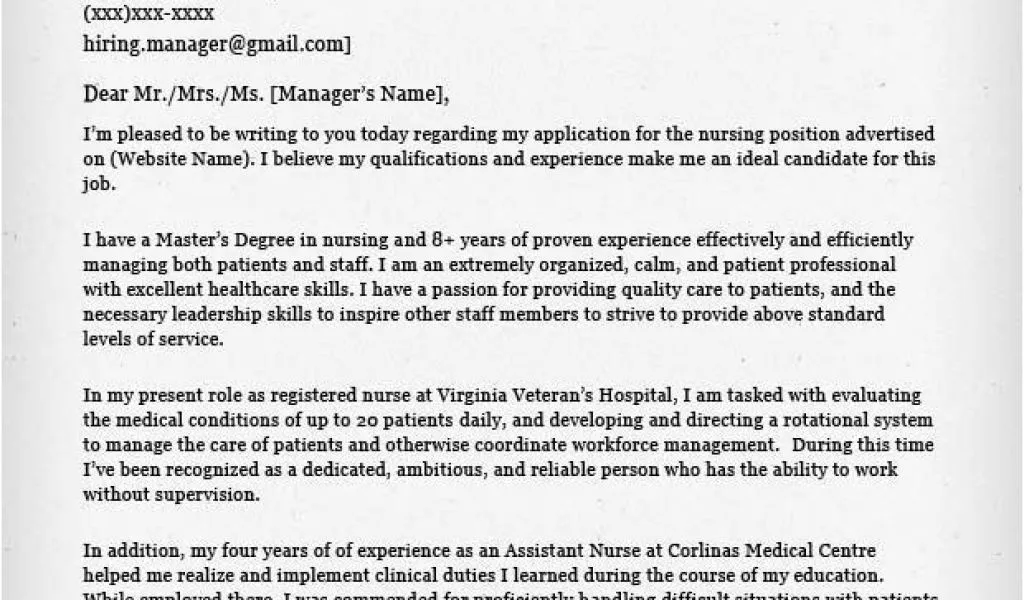
The opening paragraph is your chance to make a strong first impression. Immediately state the position you are applying for and where you saw the advertisement. Briefly mention something that sparked your interest in the role or the organization. Show your enthusiasm and explain why you are excited about the opportunity. Consider starting with a compelling statement about your qualifications or a specific achievement that directly relates to the job. This will grab the reader’s attention and encourage them to read on.
Body Paragraphs: Showcase Your Value
The body of your cover letter is where you sell yourself. Explain your relevant experience and skills in detail. Provide specific examples of your accomplishments, quantifying them whenever possible. Tailor each paragraph to match the requirements outlined in the job description. Describe your experience with relevant medical equipment, patient care techniques, or specialized areas. Highlight any certifications or specializations that make you a strong candidate. Emphasize your ability to collaborate effectively with a healthcare team and your commitment to providing excellent patient care. Don’t just list your skills; demonstrate how you’ve utilized them to achieve positive outcomes.
Closing Paragraph: Call to Action
Conclude your cover letter with a strong call to action. Reiterate your interest in the position and express your enthusiasm to discuss your qualifications further. Thank the hiring manager for their time and consideration. Include a clear statement of how you can be reached for an interview. This might include stating that you look forward to hearing from them soon. Maintain a professional tone throughout your cover letter to leave a lasting positive impression. Proofread carefully before submitting, and make sure your contact information is accurate.
Tailoring Your Cover Letter for RN Positions
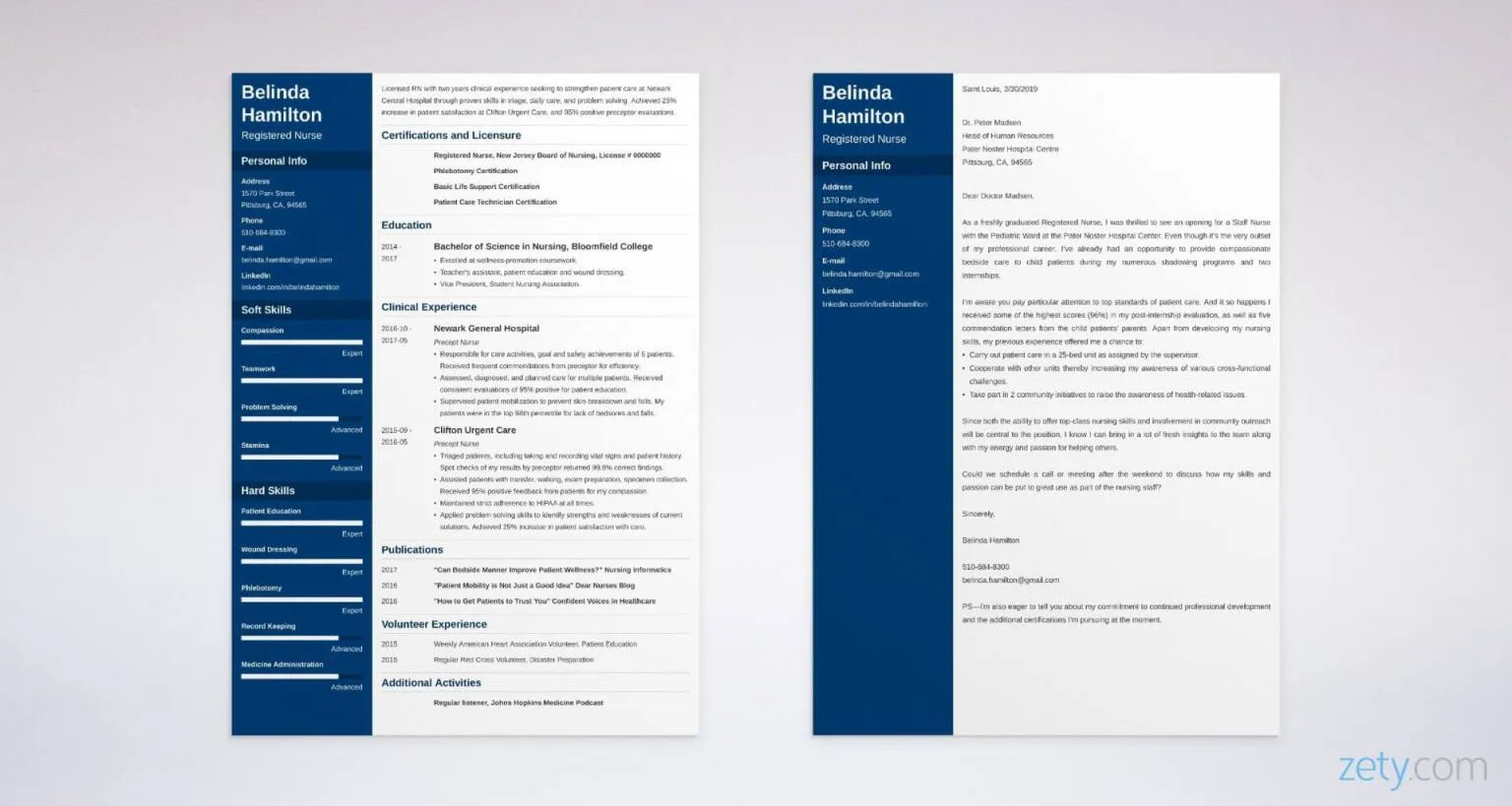
Researching the Employer and Position
Before writing your cover letter, thoroughly research the employer and the specific RN position. Understand the organization’s mission, values, and culture. Look at their website, social media profiles, and any available information about the department or unit where you’d be working. Familiarize yourself with the job description and identify the key requirements. Understanding the needs of the employer allows you to tailor your cover letter to highlight the skills and experiences that are most relevant to their needs. Show that you are genuinely interested in their organization and have taken the time to learn about them.
Matching Skills to Job Requirements
Carefully review the job description and identify the skills and qualifications the employer is seeking. Make a list of these requirements and then match them to your own skills and experiences. In your cover letter, directly address each of these requirements and provide specific examples of how you have demonstrated those skills in the past. This might involve discussing your experience with specific medical equipment, patient populations, or nursing procedures. By clearly demonstrating that you possess the skills needed to excel in the role, you greatly increase your chances of being selected for an interview. Remember to use the keywords from the job description where appropriate.
Demonstrating Relevant Experience
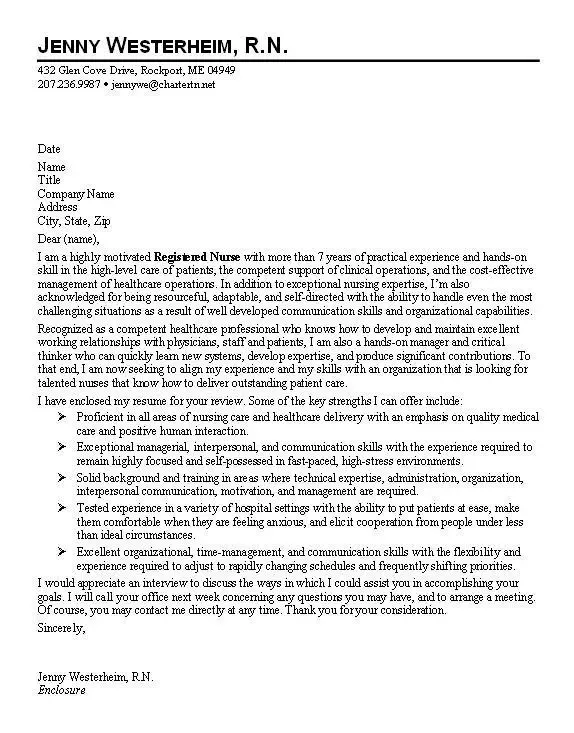
Use your cover letter to showcase your relevant experience, including clinical experience, volunteer work, and any other experiences that demonstrate your nursing skills. Provide specific examples of your achievements, highlighting the positive impact you have made. This might include examples of patient care, teamwork, problem-solving, or leadership. Use action verbs to describe your accomplishments and quantify your results whenever possible. Be sure to provide details about the types of patients you’ve worked with, the procedures you’ve performed, and the outcomes you achieved. This concrete information will give the employer a clear picture of your capabilities and experience.
Formatting and Style for an RN Cover Letter
Professional Formatting Guidelines
Adopt a professional format to make a positive impression. Use a standard font like Times New Roman or Arial, size 11 or 12. Ensure your cover letter is well-organized with clear headings, concise paragraphs, and adequate spacing. The margins should be set at one inch on all sides. Maintain a professional tone throughout the document, avoiding slang, jargon, or overly casual language. Ensure the document is easy to read and visually appealing. Make sure the document is well-structured to keep the reader engaged and highlight your key qualifications. Consider using bullet points to list skills or achievements, making the information easier to scan.
Using Action Verbs and Keywords
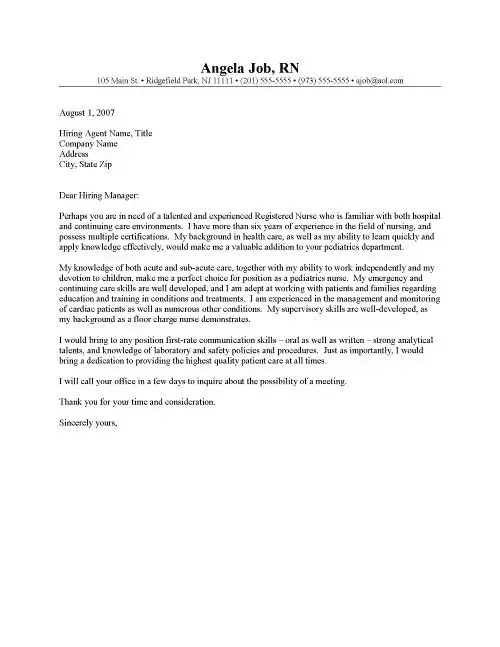
In your cover letter, use strong action verbs to describe your skills and accomplishments. This makes your writing more dynamic and engaging. Instead of saying ‘Responsible for patient care,’ say ‘Provided comprehensive patient care.’ Incorporate keywords from the job description to help the hiring manager quickly see that you possess the required skills and experience. Keywords are words and phrases that the employer uses to describe the role. Using these relevant keywords will help your cover letter get noticed and make it through applicant tracking systems. Make sure your cover letter clearly reflects the requirements outlined in the job posting.
Proofreading and Editing
Before submitting your cover letter, proofread it carefully for any errors in grammar, spelling, or punctuation. These mistakes can create a negative impression and undermine your credibility. Have a trusted friend or colleague review your cover letter for clarity, accuracy, and overall effectiveness. Multiple sets of eyes can catch errors that you might miss. Ensure that the format is consistent and easy to read. Make sure your contact information is correct. Thorough proofreading and editing are critical to demonstrating your attention to detail and commitment to excellence.
Common Mistakes to Avoid in RN Cover Letters
Generic Cover Letters
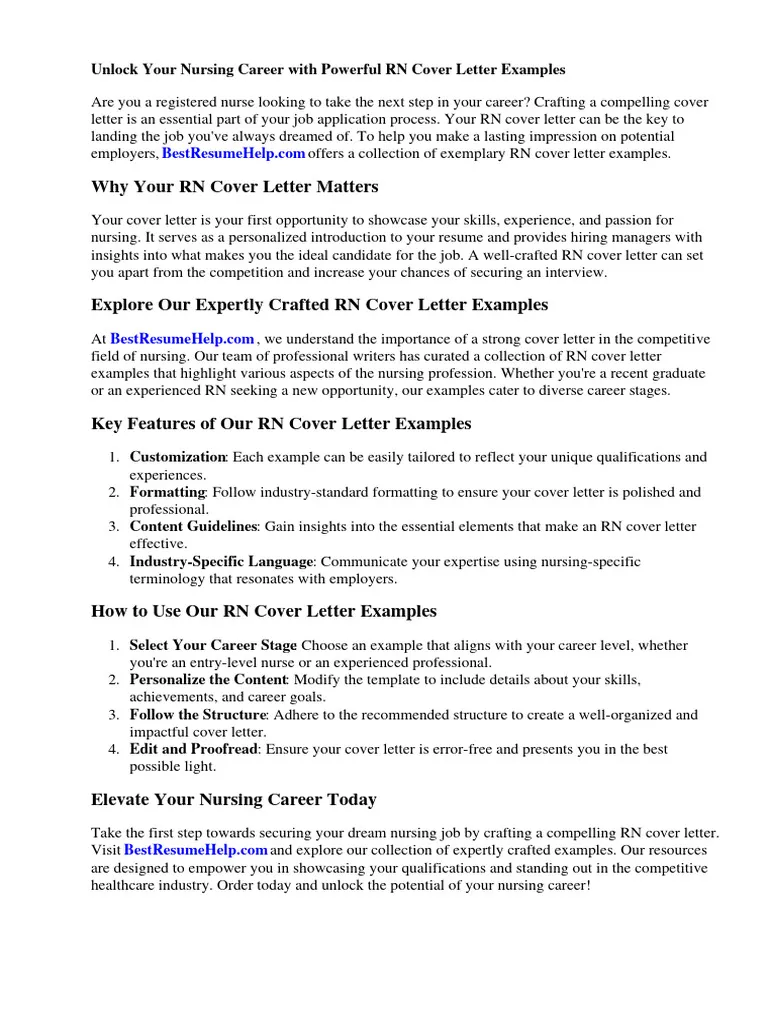
Avoid using generic cover letters that are not tailored to the specific job and employer. Generic letters show a lack of genuine interest and may be quickly discarded. Customizing your cover letter to match the specific requirements of the position will demonstrate your sincere interest and your understanding of the role. Research the employer and the role. Tailor the language and examples to match their values and needs. Address the specific requirements outlined in the job description. Always personalize your cover letter for each position to stand out from the crowd.
Focusing on Yourself Instead of the Employer
While it’s essential to highlight your skills and experience, avoid making your cover letter solely about yourself. Instead, focus on how your skills and experiences can benefit the employer. Frame your accomplishments and qualifications in terms of the value you can bring to the organization. Show that you understand the employer’s needs and how you can contribute to their mission. Demonstrating your understanding of their goals and values will make a positive impression. Always keep the employer’s perspective in mind as you write and structure your letter to emphasize how you can solve their problems.
Typos and Grammatical Errors
Typos and grammatical errors can undermine your credibility and give the impression that you lack attention to detail. Before submitting your cover letter, carefully proofread it for any errors. Have someone else review the document. Consider using spell-check and grammar-check tools, but do not rely on them entirely. Always check your work to ensure your application is polished and professional. A flawless cover letter demonstrates your professionalism and increases your chances of making a positive impression.
Examples of Effective RN Cover Letter Content
Example 1: New Graduate RN
For a new graduate RN, highlight your clinical experiences during nursing school, any volunteer work, and your skills. Focus on your eagerness to learn and your commitment to patient care. Emphasize your understanding of nursing principles and your ability to work collaboratively with a healthcare team. Consider mentioning any clinical rotations that align with the specialty the job requires. Your cover letter should highlight your education, clinical experience, and dedication. For example, ‘During my clinical rotation in the ICU, I assisted in managing critically ill patients, developing proficiency in administering medications and monitoring vital signs.’ Show your willingness to learn and contribute to a positive work environment.
Example 2: Experienced RN
For an experienced RN, focus on your specific nursing expertise and accomplishments. Provide quantifiable results and examples of how you’ve contributed to improved patient outcomes. Showcase your experience in a specific specialty, if relevant. Highlight any leadership roles or special projects you’ve taken on. For instance, ‘As a charge nurse on the oncology ward, I successfully implemented a new patient education program, resulting in a 20% improvement in patient adherence to treatment plans.’ Always link your experience to the requirements of the job, showing how you can contribute to the team’s success. Demonstrate leadership capabilities and problem-solving skills.
Example 3: RN Seeking a Specialization
When seeking a specialization, focus your cover letter on the related skills and certifications. Clearly state your specialization. Emphasize your relevant experience and your understanding of the unique demands of the specialty. For example, ‘As a certified critical care nurse, I have extensive experience managing patients with complex medical conditions, proficient in operating advanced medical equipment and implementing evidence-based protocols.’ Highlight any continuing education courses or advanced certifications you have obtained. Connect your specializations and expertise to the needs of the employer. Detail any experience in this particular specialty, showcasing how you can use your expertise to contribute.
Tips for Submitting Your RN Cover Letter
File Format and Naming
Submit your cover letter in a professional and easily accessible file format, such as PDF. PDF files preserve the formatting of your document, ensuring that it appears exactly as you intend, regardless of the recipient’s operating system or software. Use a clear and professional file name, such as ‘YourName_CoverLetter_RN_Application.’ This makes it easy for the hiring manager to identify your document. Avoid any unprofessional or informal file names. Always check the application instructions carefully to ensure that you are following all requirements.
Following Application Instructions
Carefully review the job posting for specific instructions on how to submit your cover letter and resume. Following instructions precisely demonstrates your attention to detail and respect for the hiring process. If the instructions specify a particular format, file name, or method of submission, adhere to them. Ignoring application instructions may lead to your application being overlooked. Confirm all requirements before submitting to increase your chances of getting hired.
Follow-up Strategies
After submitting your cover letter and resume, follow up with the hiring manager to express your continued interest in the position. You can send a brief email or make a phone call to reiterate your qualifications and inquire about the status of your application. Follow up about a week to ten days after submitting your application. Thank the hiring manager for their time and consideration. When following up, keep the communication professional and concise. Consider restating your interest in the role and mentioning a key skill or experience that aligns with the job description. A well-timed follow-up demonstrates your enthusiasm and initiative.
